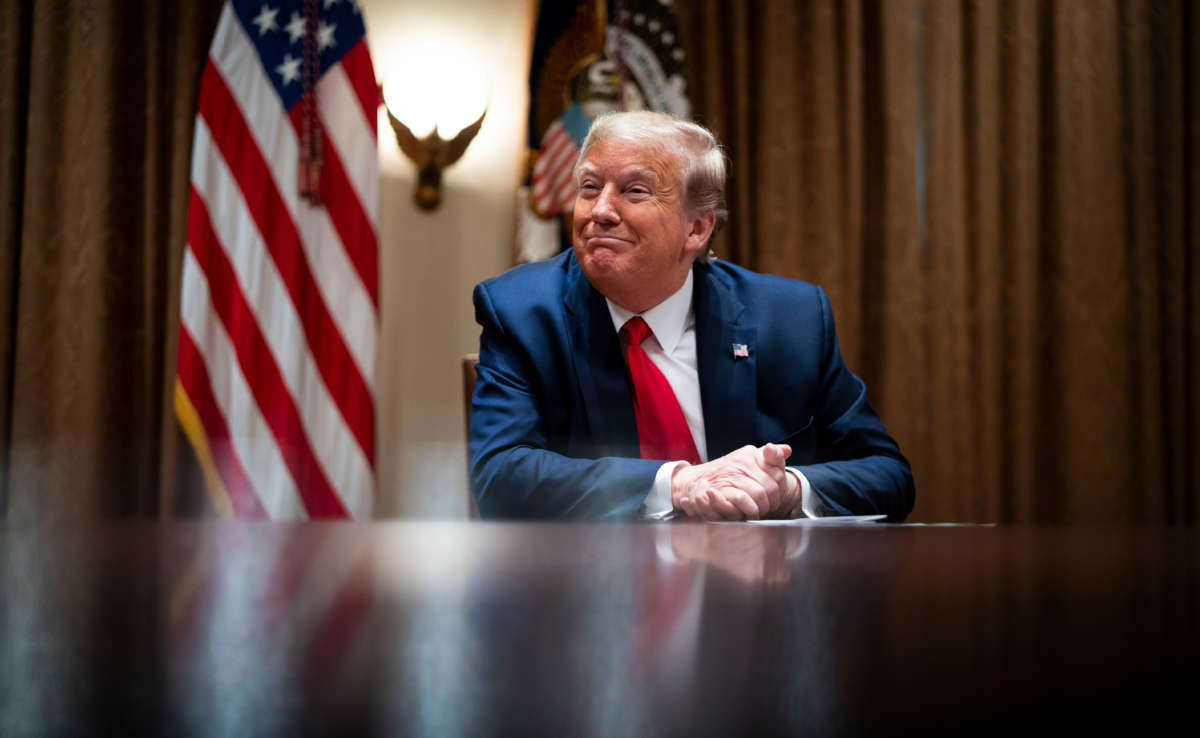Even though he frequently sought to downplay the threat that coronavirus posed to the country in public statements, behind the scenes former President Donald Trump had apparently suggested the pandemic ought to be used to delay or even cancel the 2020 presidential election.
Trump had insinuated the possibility of doing so in tweets in late July, making the baseless statement that mail-in ballots would make the election “the most INACCURATE & FRAUDULENT” in U.S. history. But according to a new book by journalist Michael Wolff, “Landslide: The Final Days of the Trump Presidency,” the former president also asked his chief of staff and others about canceling the election in a more direct manner.
Earlier in July, Trump talked to his chief of staff Mark Meadows about the idea of “calling it off,” referring to the election. “People can’t get to the polls. It’s a national emergency. Right?” Trump said, per Wolff’s book.
After Meadows explained that there isn’t a constitutional way to do so, Trump pressed the issue more. “I’m sure there might be a way, but … well …” Wolff quoted Trump as saying.
A few days later, he brought up the idea once again, this time to former New Jersey Gov. Chris Christie, who was helping Trump with debate preparations.
Trump told Christie he was thinking of calling things off. Christie thought he meant the debate prep, but Trump elaborated that it was the election that he was considering canceling.
“No, the election — too much virus,” Trump reportedly said to Christie.
Christie responded that he can’t do that, according to those who spoke to Wolff about the issue.
“You do know, you can’t declare martial law. You do know that, right?” Christie apparently added.
According to the Constitution, only Congress may initiate the change of federal election dates. The president has no power or authority to do so on their own.
Trump’s comments to his White House and campaign staff in July came at a time when he was down significantly in the polls against his main opponent to whom he eventually lost in the 2020 race, President Joe Biden. According to an aggregate of polling data collected by Real Clear Politics, Biden was leading Trump at that time by around 7 percentage points.
Trump’s suggestion of using COVID-19 as a pretext for delaying or canceling the election would have likely been met with heavy resistance, given that he downplayed its threat to the American people throughout the pandemic, wrongly stating on several occasions that it was no more deadly than the common flu.
In addition to Wolff’s collection of accounts regarding the Trump administration’s final days, a number of other books are also being released, which detail similar disturbing comments that the former president made while in office. Journalist Michael Bender, in his new book “Frankly, We Did Win This Election”: The Inside Story of How Trump Lost, also showcases how Trump became an apologist for Adolf Hitler during a trip to Europe in 2018.
Trump had traveled across the Atlantic Ocean to commemorate the 100th anniversary of the end of World War I. While there, Trump’s chief of staff John Kelly was briefing him on the various players in that conflict. That history lesson included Kelly connecting “the dots from the First World War to the Second World War and all of Hitler’s atrocities,” Bender’s book said.
Trump interrupted the lesson to describe Hitler in positive terms.
“Well, Hitler did a lot of good things,” he reportedly said.
The remarks “stunned” Kelly, Bender’s book goes on to say, and the chief of staff told Trump “he was wrong.” Trump was “undeterred” and continued to defend Hitler’s actions, particularly on the economy of Germany in the 1930s.
“Kelly pushed back again, and argued that the German people would have been better off poor than subjected to the Nazi genocide,” Bender wrote.
Press freedom is under attack
As Trump cracks down on political speech, independent media is increasingly necessary.
Truthout produces reporting you won’t see in the mainstream: journalism from the frontlines of global conflict, interviews with grassroots movement leaders, high-quality legal analysis and more.
Our work is possible thanks to reader support. Help Truthout catalyze change and social justice — make a tax-deductible monthly or one-time donation today.
